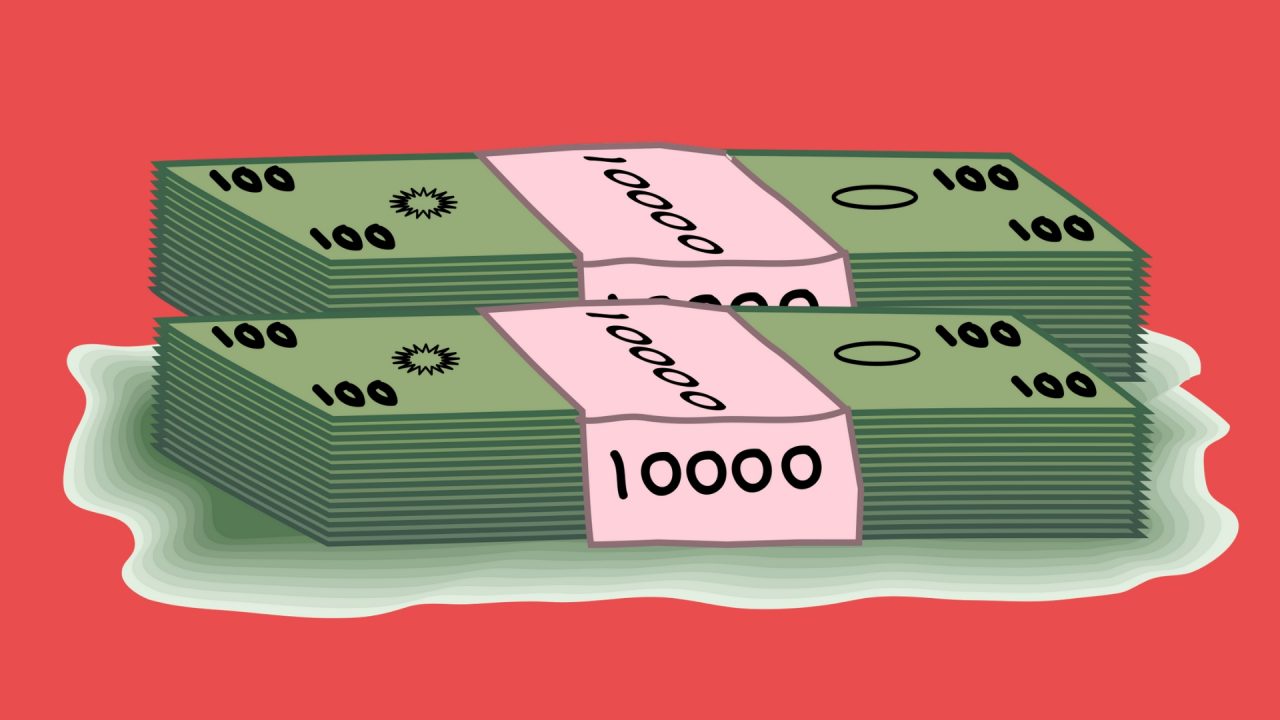
How should economists think about sex work?
Sex work, like all work, is the swapping of a person’s labour (in this case, sexual services) for money or goods. People of all genders, sexualities and backgrounds work in the sex industry, and job titles can range from prostitute to porn actor, to stripper, webcam performer, escort, sugar baby, dominatrix, sex toy tester, burlesque dancer and phone sex operator.
It’s a big industry: there are currently about 10,000 people working as lap-dancers in Britain and 72,800 working as prostitutes. (That’s about the same number as all the staff working for the NHS in Wales). And it’s one almost all Brits are involved with, as either a worker or a consumer (over half of Brits watch porn, over a quarter have visited a strip club, and more than one in tenBritish men has employed a prostitute).
But why are we talking about it? (And risking some seriously quizzical looks from our boss if they catch us checking the current cost of an hour’s sex?) Well, it’s partly because where we work and what work we do is such a huge part of our economy. But it’s also because sex work in particular is often ignored in economic discussions because it’s not seen as “mainstream work” (despite the huge numbers of us participating in it) and we wanted to give it some much-deserved attention.
And a quick note before we delve in: we know that to some, sex work is a sensitive, controversial and emotional topic, while for others it’s a taboo we need to eradicate. Either way, we know that most people have very strong opinions about it. While we want to look at sex work’s impact on the economy through the same framework we’d apply to any other job (which includes encouraging a deeper analysis of context and history), we are mindful that even as we type this there are sex workers being negatively impacted by the stigma and dangers that can surround this profession.

Now, a quick history lesson (don’t pretend you’re not excited)
You’ve almost certainly heard that sex work is “the world’s oldest profession”. But is it? Well, it’s tricky to say, but it’s certainly been around a very long time: there were brothels in the Roman Empire, and concubines in the Bible. But the actual phrase “the world’s oldest profession” is much more recent. It comes from the author Rudyard Kipling (him of The Jungle Book) and it’s was the opening line of a story he wrote in 1888. The more you know, right?
Sex work seems to have been pretty much accepted as par for course in the UK until about the 19th century, when a combination of greater religiosity and straight-laced Victorian morality caused lots of people to get rather uppity about it. The result was that sex work was criminalised in 1824 under The Vagrancy Act, and anyone found guilty of selling sex would be sentenced to a month’s hard labour. But widespread poverty and a sexist restriction on the types of jobs open to women meant sex work continued to be the fourth most-common job for Victorian women.
Although sex workers continued to be persecuted by the law well into the the 20th century, their clients weren’t specifically targeted until 1985, when the Sexual Offences Act made it illegal to go around asking people to have sex with you for money (aka “kerb crawling”). But since then, there has been a shift away prosecuting sex workers in favour of going after anybody involved in any exploitation, profiting and/or trafficking of sex workers.
Nowadays, the World Health Organisation says “all countries should work towards the decriminalisation of sex work” and sex work in Britain (but not Northern Ireland) is indeed completely legal. However, you are not allowed to offer your services on the street, own a brothel, be a pimp, or pay for sex with someone under 18 or someone who has been forced into the work, regardless of whether you knew about the coercion or not.

If your goal is to grow the economy, then the sex industry contributes billions every year
The ONS (Office for National Statistics, which - unsurprisingly - collects national statistics) says that prostitution alone put £5.3 billion into the UK economy in 2009. Porn is another £1 billion, and strip-clubs £300 million. That’s a decent chunk of money: the Premier League, which is watched by 4.7 billion peoplearound the world, puts just £3.36 billion into the UK economy each year.
Lots of economists get excited about anything that puts a lot of money into an economy, because that’s how you get economic growth and higher GDP. GDP is the total worth of all the goods and services a country produces. Economic growth is when that amount is bigger than it was previously. Both have been widely criticised for, among other things, not prioritising people’s happiness or the environment, but they remain the yardstick by which most politicians and economists around the world judge an economy’s success.
So if you like growth, sex work = more tax = more public spending. If you've got other priorities, there's a whole other bunch of concerns we need to think about. Such as ...

Sex work is regarded as an exploitive profession that makes sex workers unhappy
A large minority of Brits (44 percent) and two-thirds of young Brits think that sex work “exploits women and should be a criminal offence” (although men, trans and non-binary people all do sex work, about 88 percent of sex workers are female). A common argument is that sex work significantly lowers people’s quality of life by exposing them to things like violence, crime and drugs.
It is true that sex workers are employed in an industry that can make them vulnerable to crime and exploitation. Although sex workers are about as likely as the average Brit to have been the victim of a crime, their mortality rate (i.e. the number of deaths as a percentage of the group) is twelve times higher than the national average for cis women. That’s partly because women are more likely to be murdered on the job as a sex worker than in any other profession, and partly because many sex workers are also in the sort of vulnerable situations that are linked to higher death rates: things like poverty, homelessness and drug use.
Of course, these figures may be skewed by the fact that the stigma and criminality which still surrounds sex work limits its recruitment pool and often pushes it out of the formal economy. Legalising brothels, for example, could mean that labour rights and safety standards would be enforced in them by the government. Removing stigma around sex work (60 percent of Brits said they would be “ashamed” of a relative who was a sex worker) might mean the demand for sex workers would be met by people who wanted to do the job, rather than people whose situation meant they felt unable to say no.

But sex work is also seen as a desirable, well-paid job that brings economic benefits
It is inaccurate to say that all sex workers feel disempowered or exploited by their job. When surveyed, two-thirds say they find their work “fun” and over half call it “rewarding”. Moreover, 71 percent of sex workers have previous non-sex work experience in industries like health care and education, and 38 percent hold an undergraduate degree.
That implies that many have the skills and experience to find work in other sectors if they wished, especially as the UK’s unemployment rate is currently just 4.1 percent, lower than it has been since 1975. A low unemployment rate implies that it’s relatively easily for most people to find a job.
Sex work has several advantages over other types of work that could explain why people would want to do it voluntarily. Almost all sex workers say their work is “flexible”: something a huge majority of Brits (84 percent) want from their job. And chats with sex workers found they earn an average of £2,000 a week, more than three and a half times more than the British average of £569.
(Although other research suggests this may be skewed by some very high earners - who make around £60k a year, putting them in the top five percent of British earners - and lots of lower earners making just £12k, lower than the national living wage for a full-time worker).

Does sex work entrench inequality?
One of the biggest criticisms levelled against sex work is that it is fundamentally sexist. Some people point to the fact that the vast majority of sex workers are women and the vast majority of clients men as proof that sex work only exists because of a patriarchal view that says sex should be about prioritising men’s sexual needs and ignoring women’s.
Others think that saying prostitution is okay encourages sexual violence by making some men believe that they have the right to obtain sex from any woman. They point to the fact that Nevada, the only US state that has legal brothels, also has its 4th highest level of sexual assault.
But plenty of people (including plenty of women) think sex work is a highly feminist job which economically, sexually and socially empowers woman. Plus, eliminating sex work would not eliminate sexism. As one sex worker puts it: “like many women, I'd had a lifetime’s worth of fucking that had left me feeling fucked. At least, as a prostitute, I was getting paid.”
People also worry about how high a proportion of the UK’s sex workers are migrants (41 percent, whereas migrants make up just 14 percent of the UK’s population). Evidence that migrant workers are “particularly vulnerable to abuse and exploitation” means that to some people, their over-representation in sex work is proof that sex work itself is abusive and exploitative. People have similar concerns about transgender sex workers. (We couldn’t find any UK stats, but in the US, more than one in ten transgender people have worked in the sex industry).
There’s also evidence that overt racism is present in sex work in a way that has been outlawed in other industries. Amber Ashton, a sex worker of colour, told VICE that “my rate [in a sex agency] was always less. When I questioned it I was told, ‘You’re not as desirable; you’re not as in-demand. I can’t charge as much for you because the guys won’t pay it.’ This is something that is across the board.”
But sex work may also help disadvantaged social groups, including those with disabilities who find other jobs and workplaces tricky to navigate. In another VICE interview, a sex worker with neurological disorder dyspraxia says she loves her job and points out that “I've never felt degraded doing sex work—but you know what has been degrading? Every single time I lost my job because I wasn't 'picking things up fast enough.' Years of not being able to support myself shattered my confidence.”

Sex work is a sector likely to be disrupted by tech and automation
Technology has been changing our work and workplaces for thousands of years, and its impact on the sex industry during that time has been no different. As in other industries, tech can often help sex workers. Many point tosmartphones and social media accounts as tools which make it easy for them to work independently, find clients, and build their profile (so they can charge higher fees).
Tech also helps them communicate with other sex workers. That can result in communities which offer professional support, help and advice, and makes it easier to organise into labour unions to push for better working conditions. (By, for example, pushing the government not to ban adverts for sex work).
But sex workers are also worried about how tech - in particular robotics and artificial intelligence - may displace their jobs. As tech improves, things like sex dolls and augmented-reality porn are becoming ever-more affordable and life-like. They hold several advantages over human sex workers: they can be customised to a client’s personal taste, kept permanently at home, and may even wind up cheaper as the cost of manufacturing them goes down.

Sex work is a test for how free ‘free markets’ should be
A free market is a place where anything can be sold if a willing buyer is found, and the government never interferes. According to free market economics, sex work is completely kosher as long as there is a willing demand (people who want to buy sex) and supply (people willing to sell sex).
But although lots of economists wax lyrical about free markets, very few actually believe we should be able to buy and sell anything we please. That’s either because they think some government regulation is necessary to keep things fair (so, for example, a buyer can’t be duped by being told whatever they’re buying is better than it is) or because they believe that buying and selling some things offends a common ethical code. Good examples of this are markets for child pornography and human slaves. Whether sex work falls into the immoral category is hotly debated - although a majority of Brits think both paying for and selling sex is “unacceptable”.
Plus, free markets are widely criticized. One of the reasons is they don’t price in externalities, which is economist-speak for saying that the price you pay for something in a free market doesn’t reflect it’s actual cost on people, society and the environment. With sex work, externalities might be things like the greater risk workers run of violence and/or health problems, or the shame they might feel from being stigmatised by their family or society.

Sex work is sometimes seen as a form of capitalism exploitation
Capitalism is a system where stuff (businesses, houses, biros) are owned by individual people whose primary aim is to make money/profit. Its opposite would be a society where everything was owned by everyone with an aim, say, of making everyone as happy as possible.
According to Molly Smith, who wrote a book about sex workers rights: “prostitution seems so obviously a symptom of capitalism… [because] it's unnecessary work: no one needs someone to fuck them for money”. Her point is that if we lived in a world where money had no value (because all our needs were met through community effort) then there would be no motive for people to go into sex work.
Standing against this theory is evidence that other animal species, who generally aren’t regarded as capitalists, engage in what is essentially sex work, minus any dollar bills. Female chimps sometimes swap sex for food. And female penguins who already have a mate, so aren’t looking for a reproductive partner, will trade sex with a male penguin for some of his pebbles. (Penguins like pebbles).

Sex work is a job that, like any other type of work, requires tricky judgement calls
With such a variety of opinions on the positives and negative sides of sex work, it seems unlikely that a perfect solution that satisfies everyone can be found soon. But do you think there are any steps which almost everyone could agree on for now?
And here's some other questions to ponder:
-
How do you think sex work affects your local economy?
-
How do people’s differing values affect how our economy looks?
-
Are you or have you ever been a sex worker? We’d love to hear from you.
Nobody knows how the sex industry might change in the future (UK politicians are currently considering outlawing prostitution websites and restricting Brits' access to porn). The only thing we know is that however it changes, the impact it will have on sex workers, sex customers and the economy as a whole will be complicated, nuanced… and hotly debated.



